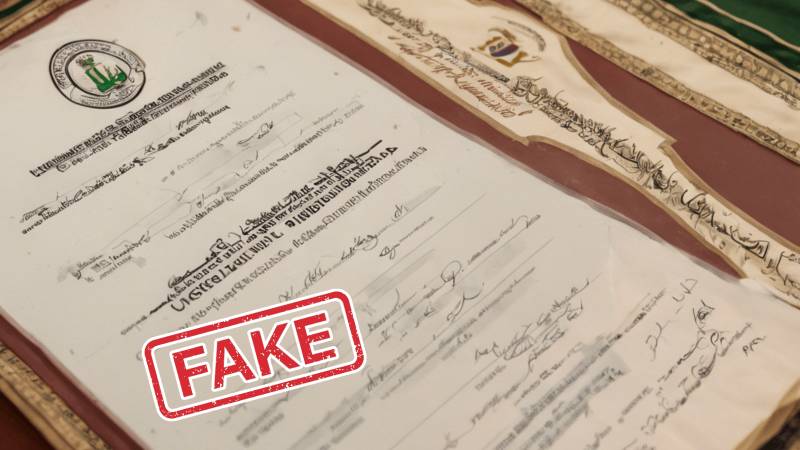
Reports surfaced over the weekend claiming that Islamabad High Court's (IHC) Justice Tariq Mehmood Jahangiri's degrees have been found to be 'fake' and that the issuing varsity has canceled them.
The claim surfaced after journalist and anchorperson Gharidah Farooqi posted on the inaccessible social media platform 'X' (formerly known as Twitter) that the Syndicate of the University of Karachi had confirmed that Justice Tariq Mehmood Jahangiri's degree was fake. She added that she had shared news about this a while ago with all relevant documents, but instead of believing her, a full bench of the IHC was assembled, which issued her notices on the matter.
Farooqi said she had told the court she was sure about her story, but instead, she was "harassed, penalised." Would those who had now been proven wrong apologise for misuse of their authority and compensate her?
What did the University of Karachi do?
On Saturday, the Syndicate of the University of Karachi met at the university in Karachi. The varsity's Vice-Chancellor Dr Khalid Mahmood Iraqi chaired the Syndicate. The forum took up several matters relating to the university, including a request from the Higher Education Commission (HEC) to build the provincial higher education commission (SHEC) offices on varsity premises.
The varsity's key decision-making body also reviewed inquiry reports against two faculty members and decided to remove them.
The body also reviewed recommendations put forward by the varsity's Unfair Means Committee (UFMC).
Per the official release of the university, the varsity, after reviewing the recommendations of the UFMC, approved them, "which proposed a cancellation of the degree and enrollment cards of the candidate(s) who were found in unethical and immoral acts."
What do these actions mean?
Per sources inside the University of Karachi, the UFMC is the relevant section within the varsity which reviews matters of fake degrees or enrollments related to the varsity.
Regarding Justice Jahangiri's degree, the source shared that the UFMC had presented a well-investigated and documented case indicating that the candidate had participated in acts during their studies and official processes that were contrary to the university's established policy. Moreover, the university could not confirm other relevant educational records pertaining to the candidate.
The source further confided that the UFMC's recommendations regarding the candidate had been pending before the Syndicate for a while before being approved on Saturday.
Meanwhile, journalist Naimat Khan posted on X that Dr Hasaan Auj, a member of the varsity's Syndicate, had confirmed that Justice Jahangiri's degree was among the issues discussed during Saturday's Syndicate meeting and that the body had approved the UFMC's recommendations.
Controversy
There was a controversy regarding the Syndicate meeting concerning one of its members, Dr Riaz Ahmed.
Per his wife's claims, he had apparently gone to the Bahadurabad police station. While his car had been pictured outside the station, he did not emerge for several hours. Later, he and his car left the station, escorted by a police van. He, however, could not be traced after that, sparking fears that he had been allegedly detained at an unidentified location.
But the police claimed he was never at the station and were unaware of his whereabouts.
Dr Ahmed, however, later returned, but the mystery surrounding his disappearance remains.
Who is Justice Jahangiri?
Justice Jahangiri is a native of the Mansehra district of Khyber Pakhtunkhwa and had become a member of the Islamabad Bar Association in 1992 and had enrolled as an advocate of the high court in 1994. He became an advocate of the Supreme Court in 2008.
An accomplished lawyer, he was elected as the president of the Islamabad High Court Bar Association for the year 2016-17, while he had previously served as the president of the Islamabad District Bar Association from 2005-6.
He had also served on prestigious government positions as well, including as the Advocate General for the Islamabad Capital Territory on the Supreme Court and the Islamabad High Court in 2018-19. Prior to that, he had served as the deputy prosecutor general in the National Accountability Bureau for the Rawalpindi / Islamabad region for the year 2009-10.
Before being elevated as a judge of the Islamabad High Court on December 30, 2020, he had taught criminal law at the Quaid-e-Azam University in Islamabad.
With regards to his academic qualifications, Justice Jahangiri's profile on the Islamabad High Court's website lists it as having studied at the Gordon College Rawalpindi and then at the Federal Government Post Graduate College in Sector H-8, Islamabad. He then secured his law degree from the University of Karachi.

